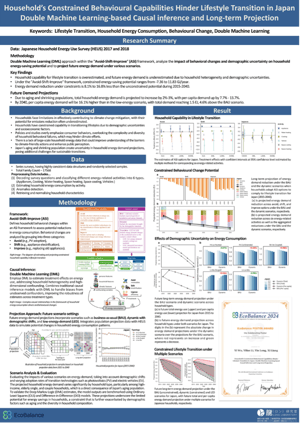Share this
On 6th November 2024, Li Yifan (Research Student), Long Laboratry, Department of Technology Management for Innovation, received Outstanding Poster Award at EcoBalance2024.


About awarded research
・Title of presentation: Household’s Constrained Behavioural Capabilities Hinder Lifestyle Transition in Japan: Double Machine Learning-based Causal inference and Long-term Projection
・Abstract: Households' potential for emissions reduction in addressing climate change is often underestimated, as their lifestyle transitions are constrained by demographic changes (such as aging and population decline) and socioeconomic factors. These transitions face particular challenges in Japan, where household heterogeneity and demographic uncertainties further complicate future energy demand forecasts. The study uses data from the 2017 and 2018 Japanese Household Energy Use Survey (HEUS) and applies a Double Machine Learning (DML) approach within the "Avoid-Shift-Improve" (ASI) framework to assess the effects of behavioral changes and demographic uncertainties on household energy-saving potential and future energy demand. The findings suggest that household capability for lifestyle transitions is often overestimated, while future energy demand may be underestimated due to household heterogeneity and demographic uncertainties. Results show that within the ASI framework, the constrained energy-saving potential ranges from -7.36 to 11.83 GJ per year, with reductions in energy demand under these constraints being 8.1% to 16.8% lower than the unconstrained potential during the period from 2015 to 2040. Additionally, projections indicate that, due to population aging and decline, total household energy demand will increase by 2%-3%, while per capita demand will rise by 7.7% to 13.7%. By 2040, per capita energy demand is expected to be 16.1% higher than in the low-energy scenario, with total energy demand reaching 1.5 EJ, which is 4.6% higher than the Business-As-Usual (BAU) scenario.
Your impression & future plan
Receiving this honor fills me with gratitude. I would like to especially thank Associate Professor Long, whose thoughtful guidance has been a crucial support in my academic journey. I also extend my sincere appreciation to my research partners. Their hard work and selfless contributions that have made this research achievement possible. This award not only recognizes my past efforts but also encourages me for my future research endeavors. Building on this, I will continue to conduct research related to sustainable development and work to ensure that our findings truly improve people's lives.
These Related Stories


